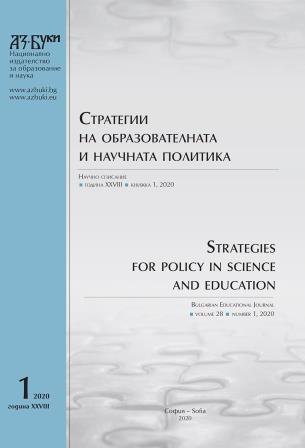Накъде води този път? Констатации, основани на някои особености на системата на основното и средното образование в България
Where Does This Path Lead to? Findings Based on Certain Particularities of the System of Primary and Secondary Education in Bulgaria
Author(s): Milen VelushevSubject(s): Politics / Political Sciences, Social Sciences, Economy, Education, National Economy, Governance, Sociology, Preschool education, School education, History of Education, State/Government and Education, Sociology of the arts, business, education, Sociology of Education
Published by: Национално издателство за образование и наука „Аз-буки“
Keywords: reform of school education; national curriculum; ISCED 11; PISA test
Summary/Abstract: The reform of the secondary education is among the declared priorities of the present state government so the public witnesses a great effort in terms of multiple amendments of the regulatory arrangement and of the organization of the pre-school and school education system. One of the most important steps in this endeavour is the attempt to achieve a formal comparison between the International standard classification of education (ISCED 11) and the national curriculum by setting a firm ceiling of 12 grades for the period of school education as well as introducing elements of the PISA tests in the national external examination. The present study is aiming, with the help of economic principles and methodology, to analyse the current stage of development of that reform. The detailed review of the results by means of discussion the available evidence and of the legal arrangement shows that the measures taken lead to an outcome, different than the one expected by the society. The reasons are many and complex but the main one is that the newly introduced law regulating the secondary education system keeps the old-fashioned philosophy of the abolished law and views the compulsory education as a necessity but does not recognize and incorporate contemporary theories about the psychological and social development of the individuals. As a result, the established rules, first, put too steep obstacles for passing between some of the education levels and second, do not correctly estimate the systematic significance of certain study subjects forming key competencies of the young people in connection with the future demand needs of the labour market. The high frequency of changes in the regulations combined with missing transparency in the moves of the administration create preconditions that obstruct students to put together along-term strategy for improvement of their knowledge, skills, and competencies. The existence of these preconditions means that the students will view each consequent change as a treat for their development and that affects the public interest in their education.
Journal: Стратегии на образователната и научната политика
- Issue Year: 28/2020
- Issue No: 1
- Page Range: 22-46
- Page Count: 25
- Language: Bulgarian
- Content File-PDF

